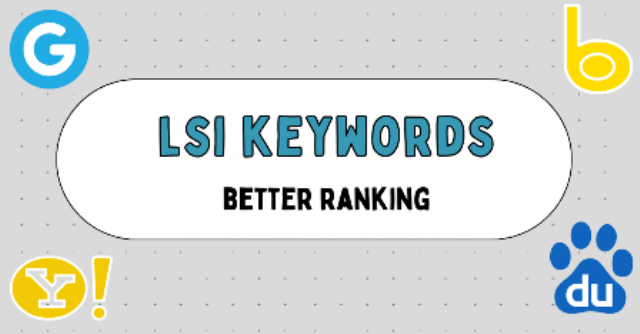LSI stands for Latent Semantic Indexing. Another related term for LSI is Latent Semantic Analysis (LSA). It is a mathematical computational Natural Language Program (NLP) designed to get various related terms of the main keyword for the searched piece of content.
Latent Semantic Indexing are words and phrase which are related and secondary to the main keywords and search queries. Search engines get a clue from these keywords that this blog is to be ranked for a particular search query. Latent semantic words and phrases are used by Online Search Engines to understand the concept and context of content on a webpage.
Example: Now, we try to understand this term with this example. Let’s say your searched keyword is ‘Skincare’. The related keywords that pop up in the drop-down list in search engines would be skin, beauty, glow, natural products, etc. These related keywords appearing after entering the main query on a search bar are called LSI (Latent Semantic Indexing) keywords.
Related terminologies
There are multiple terminologies closely linked to Latent Semantic Indexing which can be confusing for beginners when they start learning SEO. Let’s clear each one.
Many people confuse LSI with synonyms. Although they are closed terms, they do not have the exact meaning. Synonyms are words with similar meanings; however, latent semantic words give an understanding of the context. For instance, a synonym for happiness would be joy, whereas pleasure, happy life and friends are latent semantic indexing words.
Long tail keywords are the long form of the main keyword. It might be any phrase or word that adds value, context, and depth, and also complies with the reader’s intent. This long tail keyword gives a clear and in-depth picture of the content written
Fat-headed keywords are general terminologies that help to bring traffic to the site.
Advantages of LSI keywords
SEO experts highly recommend adding related and secondary phrases to a blog. They greatly increase search impressions, clicks and traffic. Here, I am briefly explaining the benefits of using these amazing keywords.
Improved content ranking
Latent semantic words help to increase the relevance of content with various keywords. Different search queries have different parameters of ranking difficulty, competition and search volume. Mostly, a website gets more traffic from related keywords rather than from the main query.
Diverse keyword usage
The use of multiple keywords that match the context of the content helps to attain SEO-optimized content. Use of mix-match of secondary keywords brings search impressions to your blog. They also suggest search engines to rank a website on different search queries.
User experience enhancement
People tend to understand certain issues when they are taught using examples and different scenarios. Therefore, it is better to use relevant phrases and optimize long-tail keywords that match the essence of the content.
Transforming SEO using LSI
Search engines use latent semantic indexing as a tool to understand the context of online content. Their web crawler scans the whole website, gathers web pages and sends them back to the data centers of search engines. Later on, advanced algorithms analyze keywords. So, search engines can suggest these pages for different queries.
Crawling and indexing mechanisms of search engines help users accurately find articles related to their respective queries. Therefore, bloggers should use related words and phrases wisely to get more traffic.
A blogger or website owner requests Google to index web pages and blogs. Search Console is Google’s service for this purpose. Search Console provides insights into indexing, website technical issues, search queries, impressions of different keywords etc. Performance reports of the console usually suggest new keywords and in fact these keywords are LSI.
In the past, web content consisted of multiple keywords that resulted in idle content. Therefore, search engines’ algorithms rely on semantic indexing to effectively assess web content. Well-known Search Engine GOOGLE gave proven results that Latent Semantic words can effectively help to rank a web page on the search engine result page (SERP).
In addition to LSI, Google also looks for other words and phrases which explain more details of the topic. For instance, if the article is about nature, commonly used keywords would be greenery, animals, humans, etc. But if there are clear and diverse words such as habitat, environment, creature, etc., it would easily grasp search engines’ attention to rank it for different keywords. These semantically latent keywords serve as a final touch to the writing canvas and make the content comprehensive.
There are multiple ways in which Google uses advance algorithms like LSI Variation, Rank Brain for contextual understanding, and semantic search. Therefore, it is important to use high-context words and incorporate these words when writing SEO optimized content.
Best tools to find LSI
There are many tools that can easily find high-quality related and secondary words, queries and phrases. They can be incorporated into your SEO blogs to get organic traffic and SERP ranking.
Multiple paid and free tools are available to find out high quality contextual words, phrase and search queries. In turn, these expressions can aid in devising a better SEO strategy for ranking blogs, articles, or web pages. Following is a list of paid and free LSI tools.
| Sr. No. | Paid Tools | Free Tools |
| 1 | SEMrush | Google’s Search Suggestions: |
| 2 | Ahrefs | Keyword Shitter |
| 3 | MozPro | LSI Graph |
| 4 | SPYFu | Ubersuggest (free for the US market) |
| 5 | KYFinder | Answer the Public |
| 6 | LongTailPro | Keywordtool.io |
| 7 | CognitiveSEO | Wordstream free keyword tool |
| 8 | Serpstat | LSI keyword generator by SEO review tools |
| 9 | KeywordTool.io.pro | Soovle |
| 10 | BrightEdge | Keyword surfer |
| 11 | RavenYools | Google Trends |
| 12 | Marketmuse | Google related articles |
| 13 | SeroWorx | – |
| 14 | Keyword Discovery | – |
| 15 | AccRanker | – |
Simple steps for using LSI in BLOG Writing
Now, I am discussing the simple steps to incorporate related words into a blog to boost SERP ranking.
- Initialize the blog writing with thorough research of the main keyword.
- After selecting the title/main heading of the content, start looking for relevant keywords. Here, LSI tools will play a significant role in assisting which keyword/phrase should be incorporated into the blog to get maximum organic traffic to the web content.
- Use either paid or free LSI tools such as Google Keyword Planner or SEMrush, etc.
- Master these tools to get maximum benefits of these tools that would aid in ranking the content on SERP.
- After this, jump into the writing step and use high-quality researched information with relevant LSI phrases that have been searched before.
- Remember, don’t overdo LSI keywords. It will negatively affect the content. Also, don’t force relevant keywords to be fitted into the content. Instead, write comprehensive, reader-friendly blog posts.
- Use LSI keywords in the headings and subheadings of the content. Try to embed LSI keywords in the initial 50% of the blog. This will not only improve SERP ranking but also enhance the readability of the content.
- Add external or internal links to the website using LSI phrases.
- Add visuals and they make the content attention-grabbing.
- Last but not least, proofread, edit, and then publish it with regular monitoring of the content. It can be done through various tools such as Google Analytics.
Conclusion
LSI plays a significant role when it comes to SEO content writing. It helps Search Engines to understand the context of the content, however it is not solely responsible for ranking. Additionally, blogger should write an engaging blog and afterwards promote it.
The use of high-quality, researched, and comprehensive information with the balanced use of LSI keywords helps the SERP to rank content at better position in search results. Strategic use of Latent Semantic Analysis tools is an on-page SEO skill that helps to get genuine traffic to websites. That’s the whole story of Latent Semantic Indexing keywords.



